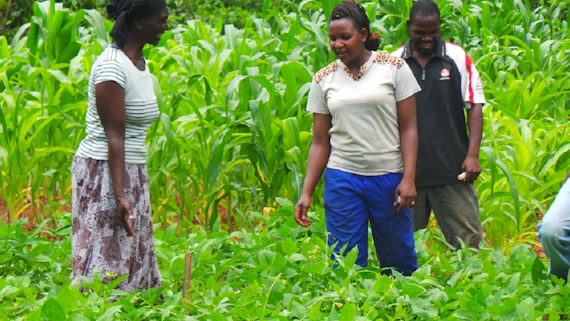Meeting the food and nutrition security needs of a growing population
This event has ended.
Contact
Add to calendar

A public lecture with Dr Muneta Grace Kangara (Nottingham University).
Abstract
Agricultural productivity in sub-Saharan Africa is largely impeded by inherently low soil fertility, soil acidity, aluminium and manganese toxicity, and low organic matter content. These background characteristics make it challenging for some biological processes such as nitrogen-fixation to thrive, further limiting soil fertility build-up. Inherently low concentrations of essential soil micronutrients, such as zinc and limited use of macro- and micronutrient-based fertilizers, results in grains of poor nutritional value posing risks of micronutrient deficiency. About 62% of pre-school aged children and 80% of non-pregnant women of reproductive age have recently been reported to be at risk of zinc, iron and folate deficiency in Africa alone.
Soil organic matter management strategies such as crop residue retention and mulching, production of nitrogen-fixing grain legumes and green manure cover crops, and organic nutrient resources such as cattle manure and woodland leaf litter offer great potential to improve soil and crop productivity. These technologies could be complimented with mineral fertilizers in an approach called Integrated Soil Fertility Management.
Sustainability - what next?
What do we want the world to look like in 2030, and how do we achieve this? In 2015, UN Member States agreed on the Sustainable Development Goals, a blueprint for tackling many of the challenges affecting communities around the world. Meeting these goals requires engagement, including by those involved in the Earth and environmental sciences. In this series, experts from a variety of disciplines examine the concept of ‘sustainable development’ and explore its implications on the use of diverse natural resources.
Our public lectures are free events that attract a diverse audience including the public, secondary school pupils and professionals. The series aims to open up areas of interest in the Earth and environmental sciences and present new research in this area to the public.
Parking
Our on-campus parking rules have changed. Parking at the Bute Car Park will only be available free of charge to attendees who submit their vehicle registration number. A sign-in sheet will be available during the lecture. Please record your details at every event.
The Main Building car park is available to blue badge holders only. Parking is very limited and there are 5 designated accessible parking bays. Visitors can reserve a parking space in advance by contacting carparking@cardiff.ac.uk.
Public street parking is available along Park Place and Museum Avenue. Charges apply before 19:00.
You do not need to book a ticket for this event.
Main Building
Park Place
Cardiff
CF10 3AT